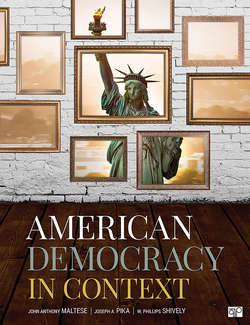Читать книгу American Democracy in Context - Joseph A. Pika - Страница 157
На сайте Литреса книга снята с продажи.
Judicial Expansion of the Rights of the Criminally Accused
ОглавлениеIn addition to specific guarantees in the Bill of Rights, the Supreme Court has used judicial opinions to expand the rights of the criminally accused. For example, it ruled in Gideon v. Wainwright (1963) that the Sixth Amendment right to legal representation applies to those who cannot afford a lawyer.117 If the accused is too poor to hire one, the court must assign one. Many states have responded by creating a system of public defenders: lawyers whose full-time job is defending indigent criminal suspects.
The so-called Miranda warnings are another prime example of the Court expanding rights. After watching countless movies and television shows in which criminal defendants are read their rights, you can probably recite these warnings by heart:
You have the right to remain silent. Anything you say can be used against you in court. You have the right to talk to a lawyer of your own choice before questioning. If you cannot afford to hire a lawyer, a lawyer will be provided without charge.
These warnings are the result of the 1966 case Miranda v. Arizona.118 Prior to this case, the admissibility of confessions in state criminal cases was judged on a case-by-case basis using the basic standard of due process, with the Fifth Amendment right against self-incrimination not applying to police interrogations. Miranda required police to warn suspects, prior to questioning, that they had the right to remain silent and to request a lawyer. Absent such warnings, information obtained from suspects may not be admitted as evidence in court. Although some criticized the Miranda warnings as an example of the liberal Warren Court affording too many rights to criminal defendants, the conservative Rehnquist Court upheld the central holding of Miranda by a 7–2 vote in Dickerson v. United States (2000).119
Yet another judicially created principle is the exclusionary rule, which prevents evidence that was discovered by illegal means—for instance, through an improper search without a warrant—from being introduced in criminal trials. Created by the Supreme Court in Weeks v. United States (1914), the exclusionary rule was originally limited to federal cases.120 Even when the Supreme Court incorporated the Fourth Amendment ban on unreasonable searches and seizures in 1949, it initially ruled that incorporation did not require states to apply the exclusionary rule.121 That changed in 1961 with Mapp v. Ohio, which required states to enforce the exclusionary rule.122 Similar to the Miranda warnings, the exclusionary rule has generated controversy. Some argue that it goes too far in protecting the rights of criminal defendants because it might allow a guilty person to go free if a police officer violates search-and-seizure guidelines. Others argue that it is an essential element of due process and an important deterrent against police misbehavior.
Miranda warnings The list of rights that police must read to suspects at the time of arrest, including the right to remain silent and the right to request a lawyer. Absent such warnings, information obtained from suspects is inadmissible in court.
exclusionary rule The principle, created by the Supreme Court, that illegally seized evidence may not be introduced in criminal trials.
In the years since Mapp was decided, the Supreme Court has made some exceptions to the exclusionary rule. One of the most significant came in United States v. Leon (1984).123 In that case, the Court ruled that evidence seized by police pursuant to an invalid warrant may be admissible because the error lies not with the police but the magistrate who issued the warrant. This is known as the good faith exception. Other countries also exclude certain evidence that has been tainted by police misconduct, but they are not as deferential to the rights of criminal defendants as we are in the U.S. Canada is a good example. Rather than assuming that all tainted evidence will be excluded, Canada calls for it to be excluded in those cases where it “is established that, having regard to all circumstances, the admission of it in proceedings would bring the administration of justice into disrepute.”124 This provides a greater opportunity for tainted evidence to be admitted than would be the case under the U.S. system.
